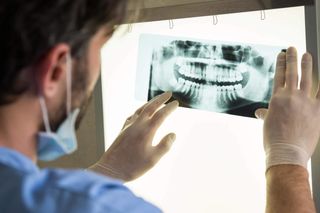DENTAL IMPLANTS & PERIODONTAL SPECIALISTS IN MONTGOMERY COUNTY, MD AND WASHINGTON, DC
WHAT IS PERIODONTAL DISEASE?


You may have gingivitis or periodontitis if you are experiencing any of the symptoms listed above. However, the only way of knowing for sure whether you have periodontal disease is by visiting a qualified dentist and being fully evaluated. Keep in mind that you may have periodontal disease and be asymptomatic; so be sure to visit your dentist for a thorough exam and cleaning at least twice per year.
Your treatment will depend on whether you are diagnosed with gingivitis or periodontitis. Minor cases of periodontal disease are usually treated with a thorough periodontal cleaning and/or other treatment including fluoride varnish and topical antibiotics. If, however, your periodontal tissues have begun to deteriorate and your gums have begun pulling away from your teeth, you may require a more complex treatment that only a periodontist can provide.
Yes. Periodontal disease can reoccur – especially if you do not make any changes to your brushing and flossing habits and you do not maintain a regular schedule of dental visits. By brushing after every meal, flossing once daily, avoiding tobacco, and getting frequent professional dental cleanings, you could help prevent periodontal disease from returning in the future.

"What an amazing physician and I'm glad that I had an issue (well not really) but I am glad I found him. He is warm and welcoming and makes sure you are comfortable through the whole procedure. If you need to stop and take a mouth break or if you feel pain he will stop and address it. His staff is friendly and helpful. I had an all around fantastic experience and I appreciate Dr. Boquel's amazing-ness."
- Kristina V.

"This guy is the real deal. He understands your pain or should I say, "Your fear of pain". I had an implant done to replace a broken incisor. Everything went smoothly. I expected pain but experienced none."
- Darcy J.

"I have absolutely nothing bad to say about Dr. Boquel or his staff members. I found them all to be very professional, extremely likable and very flexible. I am the worlds biggest wuss when it comes to dental visits, Dr. Boquel was very sensitive to my fear and really took the time and made the effort to make me feel more comfortable. The procedure itself went without a hitch. Not sure where these other not so nice reviews come from, my experience was A+"
- Jose B.

"He is fantastic. Extremely competent, treats his staff well, and is a nice guy to boot."
- Effie K.

"Dr. Boquel is wonderful. I was referred to him after a series of foul-ups by a rather incompetent and probably unethical DC dentist. I've had several appointments with him now and each time I felt I was heard, I was treated gently, I was charged an appropriate amount, I was assisted with insurance questions, and Dr. Boquel made himself available to discuss my complex situation and/or manage pain as needed. He even helped me to figure out a separate problem that wasn't directly related. I have no complaints whatsoever and I highly recommend him."
- MK G.

"Dr. Boquel is wonderful. I was referred to him for a simple gum procedure and was incredibly impressed. He was thoughtful, thorough, and I felt like he actually listened to everything I said. You can also tell a lot about a doctor the way he treats his staff. The office has a great vibe and the staff are all happy, very helpful, and love their jobs. One woman has been working with Dr. Boquel for 24 years! I highly recommend this doctor. The procedure went wonderfully and I had a great experience overall."
-C D.

"I found Dr. Boquel and the entire staff to be super friendly and amenable. This is very important to me given the seeming influx of rude staff members who couldn't be bothered with customer service at other doctors offices and places of business. Dr. Boquel explained everything very clearly and took an interest in me as the patient. Would highly recommend."
- Sarah G.

"OUTSTANDING! I've never had so much fun having 4 teeth extracted and 3 implants installed. Excellent doctor, very funny, AND very professional. Excellent bedside manner. I just had another tooth extracted last night and had a blast! No pain whatsoever. Highly recommend."
- Michael K.

| Sun | Closed |
| Mon-Fri | 8:00 AM - 5:00 PM |
| Sat | Closed |
